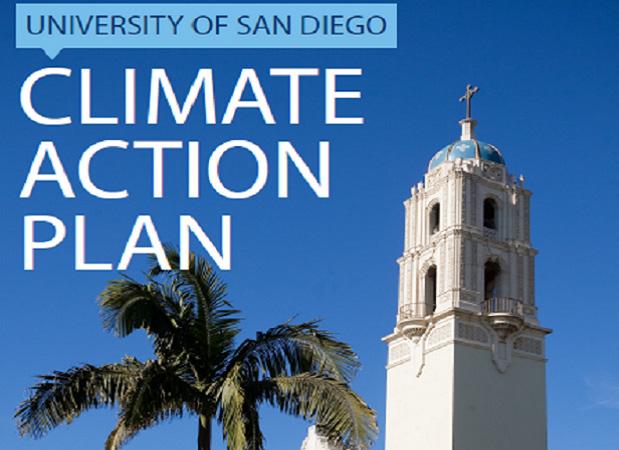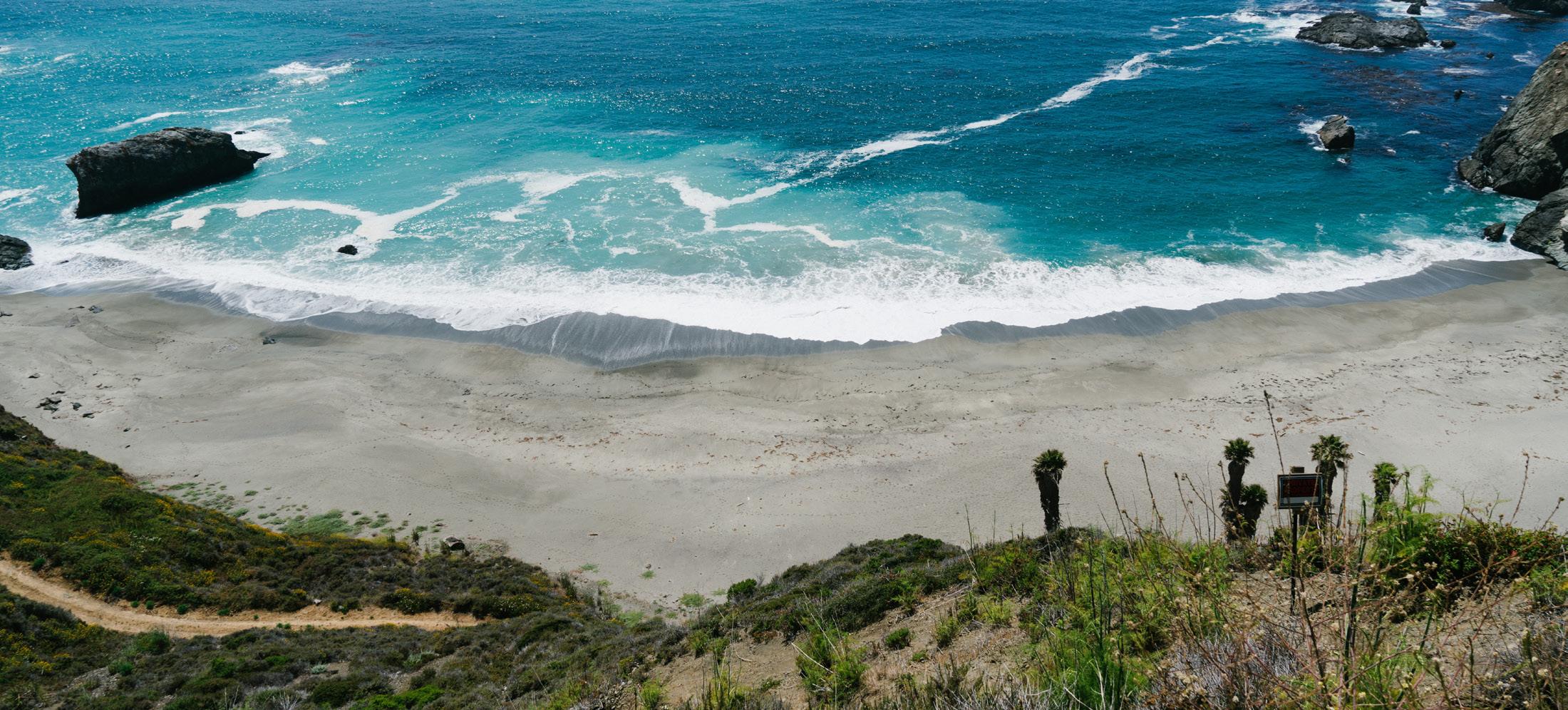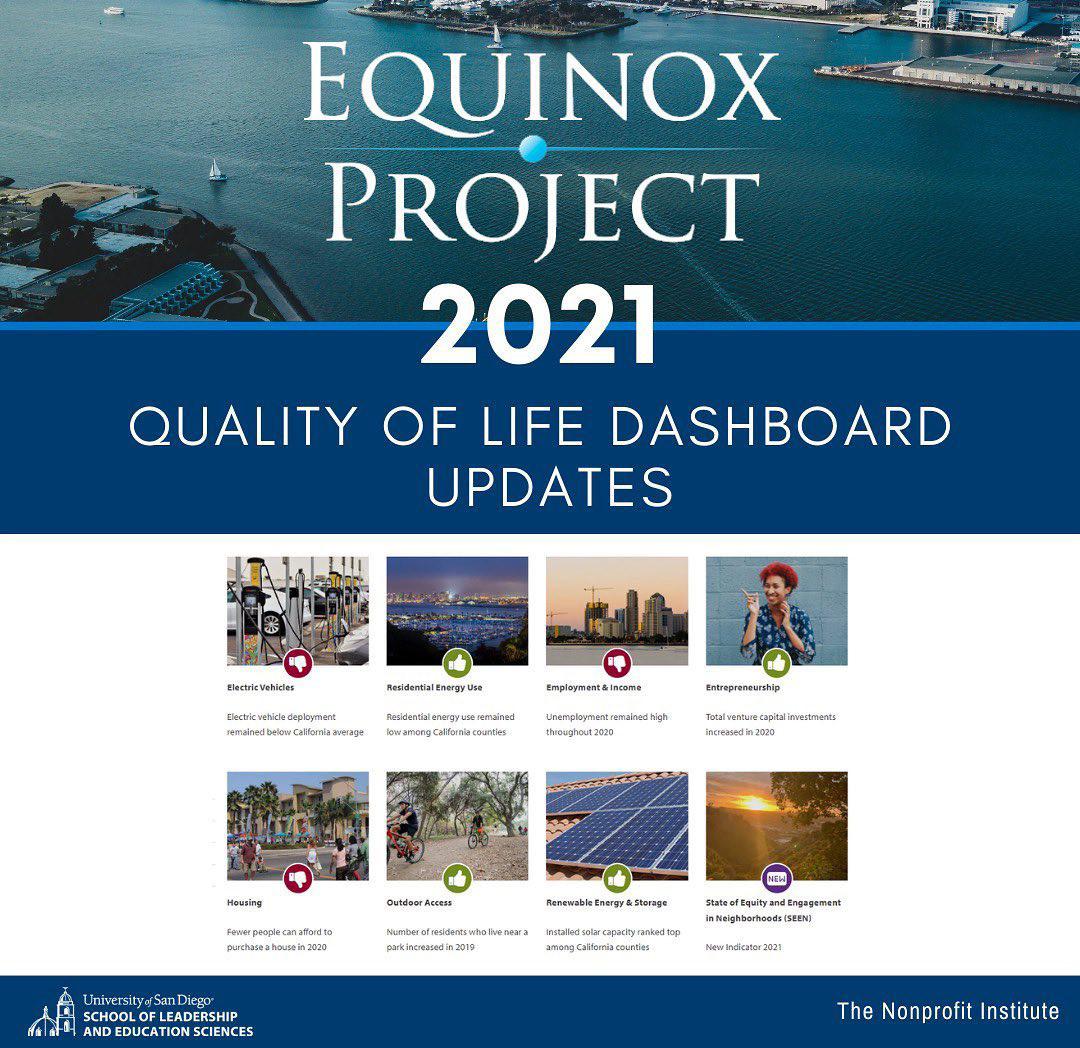
12 minute read
Goal 3: Improving Structural and Operational
Renaissance Plan See Goal 3 KPI J
In December 2021, the USD Board of Trustees Chair Don Knauss and his wife, Ellie, increased their commitment to the business school to $50 million. The Knauss Center for Business Education which will house the Knauss School of Business — where business meets purpose — will open in August 2022. Its 120,000 square feet are intentionally designed to create an innovation and collaboration ecosystem that empowers student experiences. Groundbreaking technology includes active learning classrooms, data analytics labs, a production studio, student start-up incubator spaces and dozens of collaboration spaces. Another exciting project announced this year was the approval to build a Wellness Center and Athletic Practice Facility. In addition, Olin Hall renovations will be completed in Fall 2022.
Increase Endowment and Student Scholarships See Goal 3 KPI H
As of May 31, 2022, in academic year 2021-22, USD raised more than $67.8 million, which includes $30.6 million for endowed funds, $4.3 million for endowed scholarships and $4.0 million for current-use scholarships. In particular, development raised over $1.2 million for Horizon Project scholarships which the university will match to provide scholarships for underserved populations. Strideto2024@USD and New Budget Model See Goal 3 KPIs E, G and I
StrideTo2024@USD includes three key elements: a series of initiatives to enhance efficiencies and achieve savings, the Comprehensive Administrative Review (CAR) process and the budget redesign process. The 2024 goal is to reallocate a minimum of $15 million to enhance student financial aid, attract and retain top talent and advance new strategic initiatives. As of June 30, 2022, $15 million, or 100%, of savings has been identified through a combination of the CAR process and efficiency initiatives; additionally, the university recognized and redirected $11.7 million, or 78%, of those savings toward key priorities. Consistent with the stated goals, $3.3 million was directed to enhance student financial aid and $3.0 million was to support the Horizon Project strategic initiative. Additionally, as a result of the momentum under StrideTo2024@USD in fiscal 2022, the university was able to accelerate the timeline for faculty, staff and administrator compensation adjustments by two and a half years, redirecting $5.4 million toward employee salaries to attract and retain top talent. Also, the Board was able to reinstate USD's 10% contribution to 403(b) accounts after this was put on hold during the pandemic. The Budget Model Redesign process, designed to move USD from an incremental budget model to an incentive-based model, remains in progress with the hold-harmless year planned for fiscal 2023. The new incentive model will provide a transparent and accountable budget process that facilitates the growth of the academic and auxiliary programs.

Campus as a Living Lab See Goal 3 KPIs A and D
Campus as a Living Lab formally started in Fall 2019, encouraging students, faculty members and staff to develop real-world, handson integrated course and research projects designed to enhance sustainable solutions on campus. Projects over the years have contributed to several important operational and strategic initiatives. This year, research projects were implemented in the College of Arts and Sciences, the Knauss School of Business and the Shiley-Marcos School of Engineering on topics such as food issues, sustainable clothing, social/ environmental justice, solar installations, procurement and supply chain issues and waste management. Moreover, new climate fellows supported by the Environmental Integration Lab and the Changemaker Hub produced three reports on food issues. Finally, procurement processes are being reviewed and improved as a result of projects in sustainable supply chain courses and resulting in an internship with the Office of Procurement Services at USD.
Climate Action Plan See Goal 3 KPI B
The Climate Action Plan (CAP) is a framework used to reduce USD’s greenhouse gas emissions that contribute to climate change. Approved in November 2016, the CAP sets out a general methodology for establishing short, medium and long-term strategic goals and feedback mechanisms that provide performance data and specific recommendations to reduce the environmental impact of the university. In October 2019, after advocacy from students and in consultation with campus experts, President Harris signed the Second Nature Presidents’ Climate Commitment, establishing a new campus emissions reductions goal of climate neutrality by 2035. To achieve this, the university will be updating the 2016 CAP. This year, after personnel changes, the Climate Action Committee was re-established and added new members with broader expertise and skills in specific areas. Representation was designed to cover as many relevant areas of campus as possible. Subcommittees were formed to create mini implementation plans that would be integrated into the final comprehensive version of the new CAP. Sustainability Efforts See Goal 3 KPIs C and F

This year, USD hired a new director of sustainability. The Board of Trustees (BOT) also unanimously approved two major changes to the investment policy and the energy master plan that will affect the overall ratings for USD and enhance our visibility for setting the standard in university sustainability efforts. Major changes to the investment policy include specific language from Laudato si’ with a focus on climate change and social justice. USD added clear directives and has committed approximately $60 million dollars to focus on environmental, social and governance investing opportunities, and has promised divestment from fossil fuels by 2035 to match the goal of carbon neutrality. The Energy Master Plan was approved by the BOT in March 2022. The plan is a 14-year commitment to improvements and changes to USD’s use of energy with close to $7 million in savings at the end. The plan also requires inclusion of undergraduate research and internship projects to provide opportunities for workforce development. USD continues to hold a Gold Star rating under the Sustainability Tracking, Assessment, and Rating System (STARS) organized by the Association for the Advancement of Sustainability in Higher Education. USD is developing programs that will help the university achieve its goal of a Platinum rating by the next submission in 2024.

University of Laudato si’ See Goal 3 KPI L
USD has become one of a select few universities that have been approved by the Vatican for formal designation as a University of Laudato si’ for our commitment to “Care for Our Common Home” with a specific focus on environmental and social justice issues. In the 2015 papal encyclical, Pope Francis called for urgent action to care for our common home, the poor and the vulnerable who are disproportionately impacted by global environmental problems such as climate change, pollution, access to clean water and loss of biodiversity. USD has a seven-year commitment to work on strategies to combat climate change impacts, its effects on disadvantaged communities and to design an integrated plan to show this commitment. Many of the initiatives of Goal 3 support these efforts.

The Environmental Integration Lab (EIL) seeks to bring together faculty and students in a concerted effort to connect campuswide sustainability endeavors as it relates to climate change. This year, EIL created a virtual space which includes faculty highlights on research topics, faculty expertise in particular areas related to climate change, a list of community partners and courses related to the environment. EIL also developed social media to advertise events, newsletters, and discuss important sustainability insights. In addition, faculty developed a data system that describes sister, regional and nonprofit universities’ sustainability centers across dimensions such as missions and visions, programming activities, websites, funding structures and other elements. The goal is to benchmark USD’s sustainability efforts and those of peer institutions to determine where USD is doing well and where it needs to grow. The EIL and Changemaker Hub also formed a partnership program, the Climate Alliance, which will consist of a group of 10-12 fellows, tasked with campus projects such as a campuswide oat milk default campaign, developing a campaign to feature the humans behind animal farming, or implementing the Zero Footprint Initiative (a nonprofit dedicated to building a climate resilient carbon-capture farming network). Also this year, the EIL participated in the Worldwide Teach-In, an effort to engage hundreds of universities and middle/high schools around the world by hosting a climate justice teach-in to enhance conversations about climate change. The event emphasized the importance of interdisciplinary perspectives to address climate justice. Water Justice Exchange (SIG) See SIG Assessment Plan
The Water Justice Exchange (WJE) is designed to foster collaborative multidisciplinary research, student experiential learning, policy creation and advocacy, and community projects at the nexus of water, social and environmental justice in the San Diego County and Tijuana regions. This year, an inaugural two-day Ideation Collaborative in August 2021 was held with two-dozen attendees from a wide range of USD departments and external organizations/institutions. In addition, WJE held a large, hybrid three-speaker panel and community celebration/art show event in May 2022. WJE also nurtured an active and connected WJE community that includes partnerships with many groups including California Sea Grant, Native Like Water, San Diego Audubon, San Diego Regional Water Quality Control Board, Scripps Institution of Oceanography, Sustainability Matters, Tijuana River National Estuarine Research Reserve, UCSD Natural Reserves, and the Water Tech Alliance. WJE will continue to gain more community partners. The initiative also seed-funded six proposals for >$18,000 total that resulted from the 2021 Ideation Collaborative proposal writing workshop: the Audubon Advocates Support— Prioritizing Stormwater Infrastructure for Habitat Value, the Integrative Research Project Between USD Environmental Integration Lab and the San Diego Audubon, Water Justice through the Lens of Community, the Young Environmental Justice Advocates — STEM High School Students Span Boundaries to Empower Their Communities to Improve Human Health and Environmental Protection, and the Fall in Love with Mission Bay: An Oral History Project. The WJE leadership team co-developed and utilized an award rubric to assess whether/how much to award for the proposals received. Many of the projects are still in the early stages. Next year, we will assemble an external advisory committee to assess the state of the WJE and the progress of funded work.
Equinox Project (SIG) See SIG Assessment Plan

The Equinox Project seeks to more deeply engage faculty and students by providing opportunities for research in support of the Quality of Life (QOL) Dashboard’s data for the purpose of knowledge generation, as well as opportunities to connect USD students with the Leaders 2020 Young Professionals Network in service of student learning, student success and community impact. This year’s QOL Dashboard includes two new indicators: Climate Change and Planning and State of Equity and Engagement in Neighborhoods (SEEN). The dashboard calls attention to the ways in which local nonprofits, government and businesses are working together to ensure San Diego County is on a path to greater health, wealth, comfort and sustainability for current and future generations. In the past year, the staff team, as well as graduate research assistants at the Non-Profit Institute (NPI) supported the dashboard’s annual update. Through this update, NPI staff connected with 10 additional staff members across the university, as well as engaging more than 20 faculty members and 40 undergraduate students in dialogue and research to support data and regional response projects. Additionally, the dashboard engaged more than 60 community partners to support both data collection and dissemination, as well as these partners providing direct feedback on the updated dashboard. With Leaders 20/20 (L20/20) opening its programming to the public to expand its reach across the San Diego region and within the University of San Diego amongst the COVID-19 pandemic, there was a 15% increase in USD student and faculty engagement in virtual and in-person programming over the last year. L20/20 saw an overall benefit to the organization by opening programming to the public across the San Diego region and has been able to grow its active USD membership by 20%. L20/20 also prioritized making the organization more accessible to BIPOC youth by working with regional nonprofits such as Ocean Discovery Institute and San Diego Coastkeeper to offer membership scholarships to students and elevate L20/20 mentorship opportunities. L20/20 currently has a steering committee of 11 individuals, two of which are USD graduate students in the Environmental and Ocean Sciences Department. It applied to host two USD fellows to create a direct opportunity for students to gain hands-on experience with community engagement, programming and research to elevate the San Diego region’s just and inclusive transition for its growing green workforce. Last year, a research student developed an applied framework for the successful inclusion of student-led research into the dashboard, and this year we worked with faculty in the EIL to identify new opportunities to operationalize this framework. In addition to EIL faculty, we also connected with the EIL’s research students to identify potential operational and engagement pathways for other USD students. This research and engagement are key to the project’s expansion across campus. NPI staff worked over Summer 2021 with faculty members from the School of Engineering who utilized the equinox data sets from the Water Use indicator page directly in their course curriculum to support students learning around data and data visualization. In 2021, we amended the dashboard’s “about” page to introduce a new informational section on the university’s commitment to Care for our Common Home. Graduate assistants at NPI supported dashboard staff to develop the SEEN, which focuses on broadening data resources to encompass a more holistic approach consistent with research with a social equity focus. Graduate students supported the development and analysis of new data sets and worked closely with community partners at RISE San Diego to launch the new SEEN indicator. Additionally, each of the 16 indicator pages includes a robust Regional Response section which highlights the deep roots of projects, programs and partnerships supporting the quality-of-life indicator. New work supported by the San Diego Regional Climate Collaborative hosted on USD’s campus was integrated into the water use indicator, elevating USD’s role as an anchor institution.
Changemaking in Information Technology See Goal 3 KPI K
Despite the pandemic and an already busy information technology (IT) department supporting remote learning and the e-campus environment, several new enterprise-level projects were launched this year including Workday phase 2, a major upgrade to the campus network, review of the CourseDog system, full IT configuration of the new business school buildings, several new online degrees/courses, preparations for multifunction authentication using Duo, the move to Zoom phone (instead of physical phones in offices) and the launch of many new schools/departments websites.






